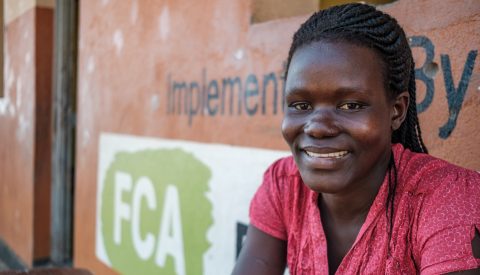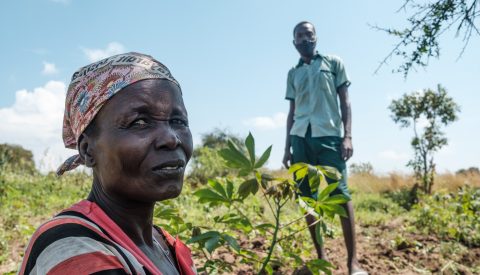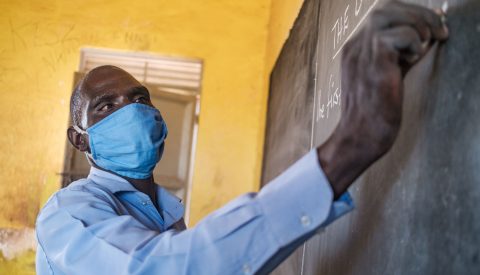Uganda hosts a new generation of high-aiming youth: “Education is crucial for girls”
The Covid-19 school closure highlighted how vital education is in Uganda’s refugee settlements. Most families are relieved that their children return to learning, but schools also report a worrying trend of girls dropping out.
Education Cannot Wait
- In 2020, a total of 107,187 learners in 57 schools in Bidibidi, Kyaka II and Rwamwanja refugee settlements benefitted from Finn Church Aid’s education project funded by the Education Cannot Wait fund.
- The project included, among other things, classroom renovation, construction of teacher housing, teacher training to improve the quality of education and distribution of scholastic materials and sanitary kits for girls.
- During school closure due to Covid-19, FCA promoted child protection and continued learning at home through home learning packages, radio lectures and teacher support for small groups of learners.
One of Uganda’s 1,4 million refugees is Sylvia Poni, 17, who found her new home here with her 75-year-old grandmother Joanne Pilista. They stay with two small children that Joanne took under her wing during the flight.
Leaving their previous life behind has been tough, but grandma Joanne believes that the quality of education in Uganda has positively impacted Sylvia. The firm structures of Yoyo Primary School are visible through the thick bush by the family’s house.
“We are from Kajo Keji where schools were made of grass,” Joanne explains. “Parents had to take time off their work to fetch grass and mud to build the schools – or prevent them from falling apart.”
Sylvia also loves the fact that there are many classrooms. She feels safe and comfortable at school, and rain or shine, lessons go on throughout the day.
Grandma Joanne never went to school herself. She wishes she could go back in time and get an education. For Sylvia, it is still possible, and she is determined to take her chance.
“I want to become a teacher and go back to South Sudan,” she says. “I want to help those who have dropped out of school so that they can achieve their goals and find jobs.”
The pandemic a blow to the education of girls
Sylvia’s most recent challenge has been the closure of schools due to the coronavirus pandemic.
In March 2020, Uganda entered a complete lockdown to stop the spread of Covid-19. Schools reopened partly in October 2020 for candidate classes, and with funding by Education Cannot Wait, Finn Church Aid (FCA) has prepared a safe return for learners like Sylvia in several schools in Bidibidi refugee settlement.

Government guidelines, such as social distancing and the use of face masks, are implemented in all schools supported by FCA.
But the return rates indicate a worrying trend: many girls fell pregnant or were married off during lockdown and have not returned to school.
“My best friend is not in class anymore, and that makes me really sad,” says Sylvia. “I do not see her anymore, and I do not hear from her anymore. She was just married off.”
“Education is crucial for girls because then they can look after their families”, she adds.
Jesca Eyotanu, 26, is originally from Arua in Northern Uganda and now works as a teacher in Yoyo Primary School. According to her, attitudes to girls’ education are changing for the better but not without challenges.
“When I started teaching here, the number of girls was very low,” she says. “But with donors advocating for girls’ education and supporting us with sanitary pads and child protection schemes, we have seen a rise in girls’ enrolment over the last few years.”

Jesca Eyotanu, 26, works as a primary school teacher.
The challenge during Covid-19, according to teacher Jesca, was that many parents thought that schools would never open again. They were quick to marry off their daughters for financial support.
“This happened to one of my learners,” she recounts. “I feel terrible about this. Now she will not stand on her own two feet, and she will face challenges in marriage. She will not be able to provide for her own basic needs, and if her husband is not wise, it can become a problem for her.”
Education lifts people from poverty
Joseph Ladu, a 16-year-old South Sudanese refugee, came with his mother Perida Yata, 49, to Uganda in 2016. Perida is a hard-working farmer, and when Joseph is not at school, he helps her at the field, under the scorching sun
“I do not make enough money. I am so grateful for the support that covers Joseph’s school fees,” says Perida. “Covid-19 reduced my income even further, and it was tough to see Joseph out of school. Education is so important to us. I have seen the schools of Finn Church Aid and the school has helped us with so many other things. Schools back in South Sudan were not like this.”
Joseph has inherited his mother’s passion for education; he wants to become a teacher.
“I want to teach English when I’m older,” he says. “The teachers here inspire me to do that. I will continue learning and eventually help my people to get jobs. My children will be educated.”

Perida Yata, 49, and her son Joseph Ladu cultivate their plot of land in Bidibidi refugee settlement.
Education brings joy and makes dreams come true
Another school made of concrete stands out in the vicinity of Yoyo Primary School. Luzira Primary School is located in the same settlement, decorated with murals and full of colour.
Emanuel Adukule, 31, teaches social studies and did not let the Covid-19 lockdown stop him from helping children learn.
“When I had to stay at my home outside the settlement during the lockdown, I made sure to help children around my community through home learning,” he says. “I knew that my presence here was important. After a few months, I decided to come back to Bidibidi to help my learners.”

Adukule Emanuel, 31, wanted to support his learners during the pandemic.
“I like teaching, and I love being with learners. Seeing them pass their exams brings me so much joy,” he continues. “This generation is the future. If we leave them without education, we shall be doomed. We have future leaders among us, and they deserve quality education to secure a good future.”
Esther Killa, 15, from South Sudan, wants to be a doctor because she wants to nurse people. Ronga, 18, wants to be a pilot and travel around the world.
Their dreams seemed distant when they were learning under trees in South Sudan, hiding from the rain and struggling to focus. Now they are part of a young generation eager to rebuild their country in a way that benefits everyone.
Text and photos: Sumy Sadurni